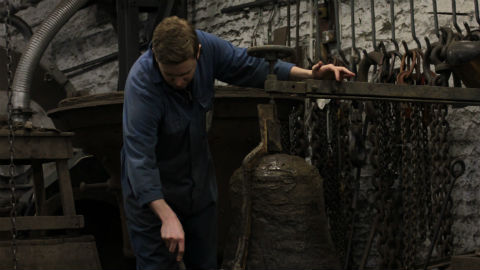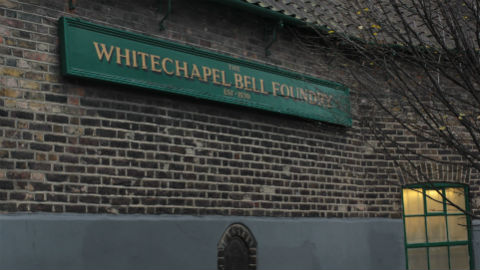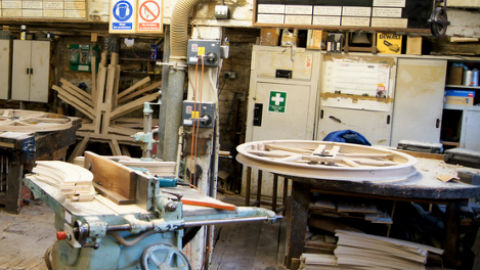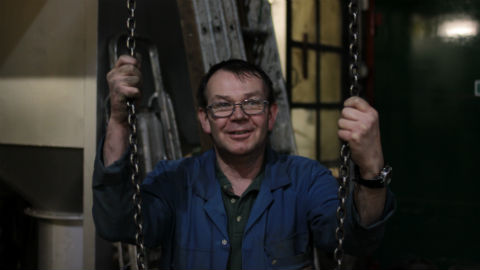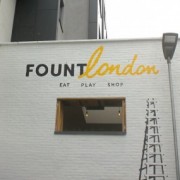Nestled between a Tesco Metro and a block of nondescript flats on Whitechapel Road, the oldest manufacturing business in Britain has been producing some of the world’s most iconic sound instruments since 1570.
In its 500 year history, the Whitechapel Bell Foundry has built the clock bells for St. Paul’s Cathedral in 1709, the original Liberty Bell in 1752, and, perhaps most famously, Big Ben in 1858.
One of only 20 bell foundries in the world, Whitechapel first opened for business in 1570 in the area that is now Brick Lane. The foundry moved to its current location in 1738.
Kathryn Hughes, 56, and her husband, Alan Hughes, 65, are the current master founders carrying on the Whitechapel legacy.
“There’s very few places that we haven’t exported to in the old empire, and actually very few places where there isn’t a bell of ours of some sort at all,” Katharyn says.
Because of the nature of the bell business, the foundry doesn’t have the returning custom that most retailers do. As Kathryn puts it, “the bells go on forever.”
“Bells last, I mean dammit, they go on, we haven’t yet worked out how to make them not,” she laughs, “they can crack and sometimes they break but they just go on and on.
Despite having bells all over the world, the foundry is still a small, family-run business. Kathryn and Alan watch over a staff of just 25 and experience all the problems typical of a small business.
“You know we’ve got 25 employees and each of us do about six jobs. And then they throw another one at you and you have to do that one as well.”
In 2002, the foundry ran into problems when Lloyds dropped their insurance and Kathryn had to find an alternative way to keep things running.
“One thing I found out was you don’t have to provide employers liability insurance for family members. So I was going to adopt everybody, and they all agreed!” she laughs.
Kathryn was able to find another provider at the last minute and keep the business running. Then, last month, she had to deal with another problem when the government tried to regulate the foundry as a scrap metal-dealer.
The cast metal association was able to fight the battle on the foundry’s behalf, but it’s problems such as these that can force small businesses into a corner.
Which made the recent decision to go online for the first time on November 26 that much more problematic.
“It’s not the sort of thing that small businesses like to deal with. I had to decide, what do I sell? How much do I sell it for? I’ve got a ton and a half bell and I’ve got table bells? Do I charge the same for the shipping? What do I do?”
The two haven’t been the most tech savvy pair. Kathryn says that they got their first household computer a little after the turn of the millennium, and for Alan, the computer was a one-trick pony.
“Having computers was a big step because Alan said ‘Computers? We don’t need computers,” she says. “We finally got a computer and it wasn’t connected to anything. Alan would play solitaire every night and that’s all he thought the computer was good for having.”
A few months ago, Kathryn and Alan were approached by Swedish company Tictail, who run free shopping sites for small businesses.
In their first day online the foundry sold more bells in the first day than they would normally sell in a week.
For Kathryn, Alan, and the rest of the staff at Whitechapel, those small problems never make their decision to run a “medieval” business the wrong one.
“It’s the fear that keeps us going. The fear of being the one who lets it go. The company is bigger than we are, it’s been here a hell of a long time and it would be awful if we were the ones responsible for it not being here anymore. I don’t think I could bear it actually.”
The two have been ringing together for 38 years, a span that includes 3 leap-year marriage proposals, all by Kathryn.
“In the end he said I suppose we might as well,” she says, “We get along very well really considering all the pressure that there are and some family businesses are very much driven apart and we’ve been very careful about trying to laugh it off when it gets really bad. The worries never go away, you never get away from it, but we laugh a lot.”
Along with their two daughters, the couple’s lives revolve around bells. That means dinner conservations about bell brass, holidays in Des Moines because there’s a bell conference in Iowa and essentially raising their children with two single parents:
“Alan would come to work early, I would stay at home with the girls and get them off to school. He would then come home for the four o’clock job and I would come home late in the evening. That’s how we worked it, I mean, poor kids,” she laughs.
Kathryn won’t say whether or not her daughters will be the ones to continue the legacy. She does say that they are interested in the business and that it’s an honour to carry on this kind of legacy.
“It’s being the Whitechapel Bell Foundry. It’s got quite a record and we’re very privileged to be the ones who are temporarily in charge of it,” she says, “this place has a personality and we survive because the quality of work is good.”

